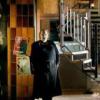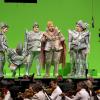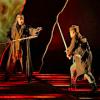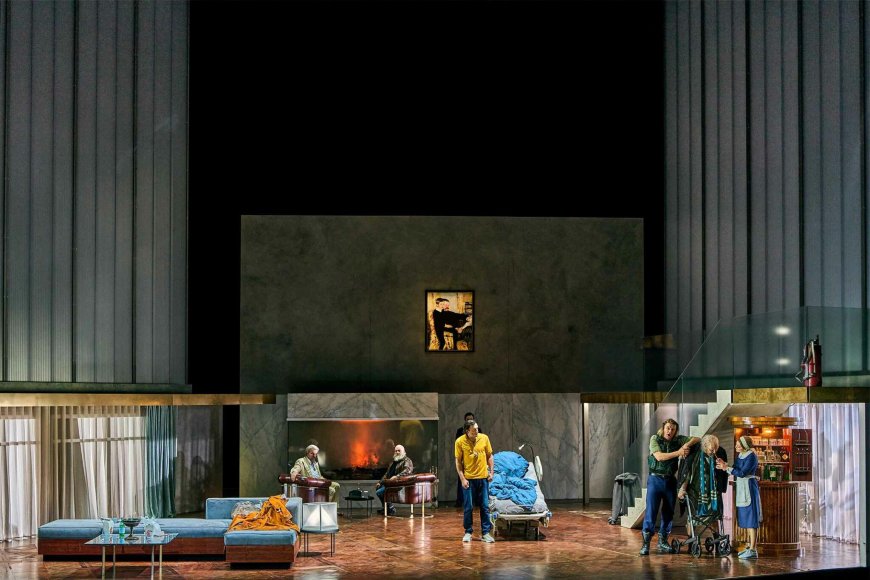
Richard Wagner’s mammoth cycle of four operas, Der Ring des Nibelungen, has just about everything an opera-lover could want: greed, abuse of power, illicit love, betrayal, murder — not to mention stirring orchestral interludes, magical scenic effects, and some of the most thrilling vocal parts in the operatic canon. All this in the service of a mythic plot framed by no less than the creation and destruction of the world.
Valentin Schwarz’s production of The Ring premiered at the Bayreuth Festival in 2022 when the Austrian director was 33; it was mounted for the last time this summer. It does away with the magic: No horses fly, no nymphs swim, no dragons transform. A nouveau riche mansion with interiors worthy of a Netflix real estate series serves as Valhalla, the gods’ castle in the sky. The setting is no mythological past, but today — smartphones are as present onstage as they are in the auditorium, when audience members photograph the curtain calls.
The result, seen July 27–31 (I was not able to attend Das Rheingold, the first opera in the cycle), is a bracing take on Wagner’s masterpiece that sheds new light on the multifaceted tale. But, like the chief god, Wotan, whose inveterate scheming leads to the story’s catastrophic ending, Schwarz has a fatal flaw: his desire for novelty often works against Wagner’s music.
Wagner opens the cycle with the symbolic birth of nature — some four minutes of E-flat major beginning with a single deep tone in the double basses that blossoms into a full orchestral texture to represent the shimmering Rhine river. Schwarz, in an image that returns at the very end of the cycle, makes the birth literal by projecting two fetuses in utero, at first calm, then fighting. The program book identifies them as Wotan and Alberich
The pairing makes sense: Alberich (referred to as “Black Alberich” in Siegfried, the cycle’s third opera) commits the original sin of stealing the gold from the Rhine. Wotan (referred to as “Light Alberich” in Siegfried) also sins against nature by cutting his law-giving spear from the World Ash Tree. The Rhine goes dark, the Ash Tree dies. These two bass-baritones scheme for possession of the ring made from the gold and the world domination that comes with it.
Schwarz’s conception shifts the focus from the corruption of nature to the corruption of youth. His production has no gold per se — just a boy in a yellow shirt, whom Alberich abducts in Das Rheingold (according to the production notes). In Siegfried, the boy returns two sizes larger as a supernumerary friend of the teenage hero. In Die Götterdämmerung (The twilight of the gods) the friend returns as the adult Hagen, Alberich’s son, himself now bent on getting the ring from Siegfried. In so doing, Schwarz makes an explicit parallel: As the gold grows from a benign element of nature into a destructive force in the story, the innocent child grows into the evil Hagen.
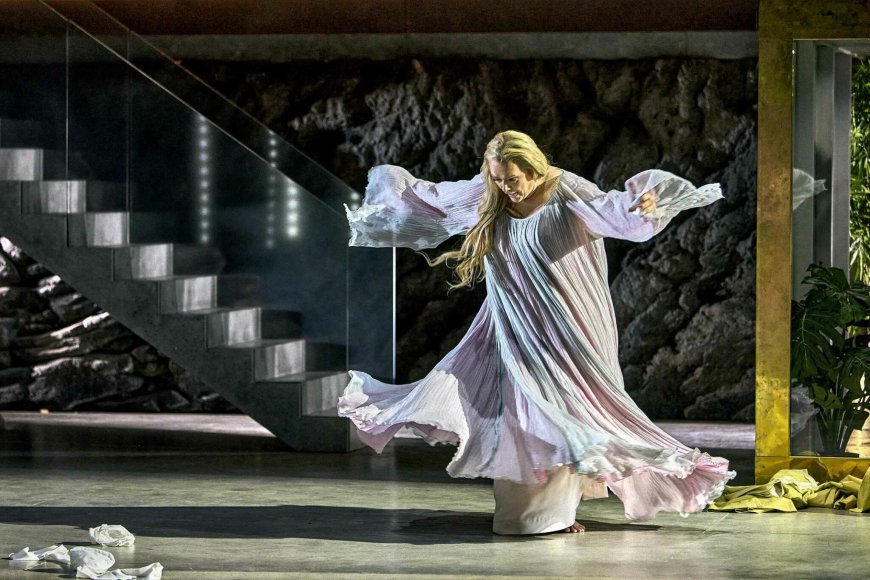
Intergenerational trauma, present most conspicuously in Wotan’s falling out with his favorite daughter, Brünnhilde, plays an even bigger role in Schwarz’s vision of The Ring. Here Wotan’s sins go beyond the scheming and philandering that make him a deeply flawed, but still sympathetic leader. Schwarz’s Wotan, a sexual abuser of his daughters Sieglinde and Brünnhilde, takes on a coarseness that contradicts the emotional depth of his monologues.
Incest has always been a controversial plot point in The Ring. Wotan’s son Siegmund impregnates his twin sister, Sieglinde, during the couple’s passionate lovemaking at the end of the first act of Die Walküre (The Valkyrie). Odd as it may sound, Wagner makes us sympathize with the couple by setting their scene of mutual discovery with music of great vulnerability and even greater beauty. It is therefore disorienting to see Sieglinde already pregnant before she first encounters Siegmund.
The program book tells us that Wotan is the father — a point that only becomes clear in the second act when he gropes the sleeping Sieglinde, going so far as to remove her underwear. That Schwarz has Sieglinde doubly abused (by her father in addition to her brutish husband, Hunding) drives home her vulnerability. But it also degrades her and deprives her of the beauty and strength intrinsic to the gentleness and power of her music.
Another problematic dissonance between stage action and music comes in the famous “Ride of the Valkyries.” Instead of the Amazon-like goddesses riding through the air to bring fallen heroes from earth to Valhalla (always a challenge to stage), Schwarz has the Valkyries lounging in what appears to be the waiting room of a plastic surgeon — some bandaged for facelifts, some for breast implants.

Dressed to the nines and reflected in a mirrored backwall, they make a striking, colorful tableau. Schwarz’s message appears to be that the ultra-rich fill their empty lives with futile attempts to buy eternal youth. Wagner’s music is all action; the waiting room static. The Valkyries “hojotohos” were impressively sung, but Schwarz provides no justification for their lusty vocalizations.
This Ring does sometimes yield surprising dividends. Schwarz reimagines Fafner, the giant who turns himself into a dragon to guard the gold, as a nasty, dying millionaire, lying in his mansion in a hospital bed attended by servants. Dangling near death, it doesn’t take much to kill him. Instead of Siegfried slaying a terrifying dragon, he simply makes the old man fall on the floor. The scene lacks the drama of a serpent emerging from its cave, but here the power of the purely human element suffices. That the Forest Bird, who directs Siegfried to Brünnhilde after he has slain Fafner, enters the scene as one of Fafner’s attending nurses makes for a smooth and charming transition.
Schwarz’s treatment of Siegfried and Brünnhilde’s farewell at the start of Götterdämmerung again shows him deaf to the score. Wagner makes the scene a continuation of the couple’s love scene at the end of Siegfried — the music sensuous, the couple’s words for each other full of admiration and affection. Schwarz stages this sweet parting of lovers as a bitter fight that terrifies the couple’s daughter (invented by the director). His interpretation keeps the production securely focused on generational trauma at the expense of sapping the music of its emotional punch.
The women of The Ring are the holders of wisdom — Freia knows how to keep the gods alive with her golden apples, the earth goddess Erda and her daughters the Norns can see into the future, Brünnhilde realizes she must sacrifice herself for the future of mankind, returning the ring to its rightful owners, the Rhine Maidens, symbols of nature. In contrast, the men tend to be combative, competitive, short-sighted, and greedy — Wotan cannot even follow the laws he himself etched on his spear to justify his power.
There is poetic justice, then, in the fact that Simone Young, the first woman to conduct The Ring with a major opera company (in Vienna, 1999) and the first woman to lead it in Bayreuth (2024) was again on the podium this summer leading well-paced and beautifully balanced performances. I wish that the orchestra roster identified which players were playing principal parts in which performances, as they were all worthy of individual recognition for their outstanding contributions. Alas, I can only single out Dániel Ember, principal horn of the Berlin Radio Symphony Orchestra, for his brilliant execution of Siegfried’s horn calls.
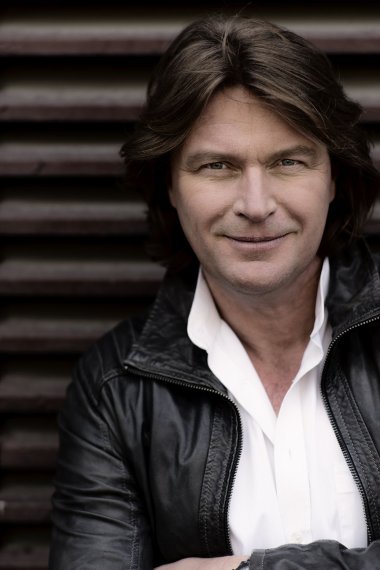
As expected in Bayreuth, the singers for this summer’s Ring were among the finest in the world. The men were especially strong. As Wotan, Polish bass-baritone Tomasz Konieczny sang with tremendous power and a grainy intensity that matched his acting. Now in his early 50s, he appears to be at his peak.
Tenor Michael Spyres brought the right combination of power and tenderness to Siegmund, and Klaus Florian Vogt tackled the superhuman demands of Siegfried with rare ease and panache. Ólafur Sigurdarson was a terrifying, brooding Alberich. Michael Kupfer-Radecky, sporting a T-shirt reading “WHO THE FUCK IS GRANE?” was made to play Gunther as a cartoonish parody, but his vocal presence matched the bracing power of Mika Kares’s Hagen. (Grane, Brünnhilde’s horse, played here by a supernumerary, was gratuitously hacked to pieces by Gunther’s servants.) Ya-Chung Huang was an agile, often manic Mime; Vitalij Kowaljow a snarling Hunding.
Mezzo-sopranos Jennifer Holloway (Sieglinde), Christa Mayer (triple cast as Fricka, Waltraute, and Schwertleite), and Anna Kissjudit (Erda), an audience favorite, were the leading voices among the women. Catherine Foster (Brünnhilde), a regular at Bayreuth since 2013, brought ebullient acting to her portrayal, but often sounded vocally tired. All of the lesser female roles — Rhine maidens, Norns, and Valkyries — were sung at a level that would qualify them for leading roles.
Andrea Cozzi’s detailed sets were always captivating, and Andy Besuch’s colorful costumes brilliant in their often-intentional trashiness. It’s too bad that Schwarz’s conception rarely allowed them to use their artistry in service of the music.


